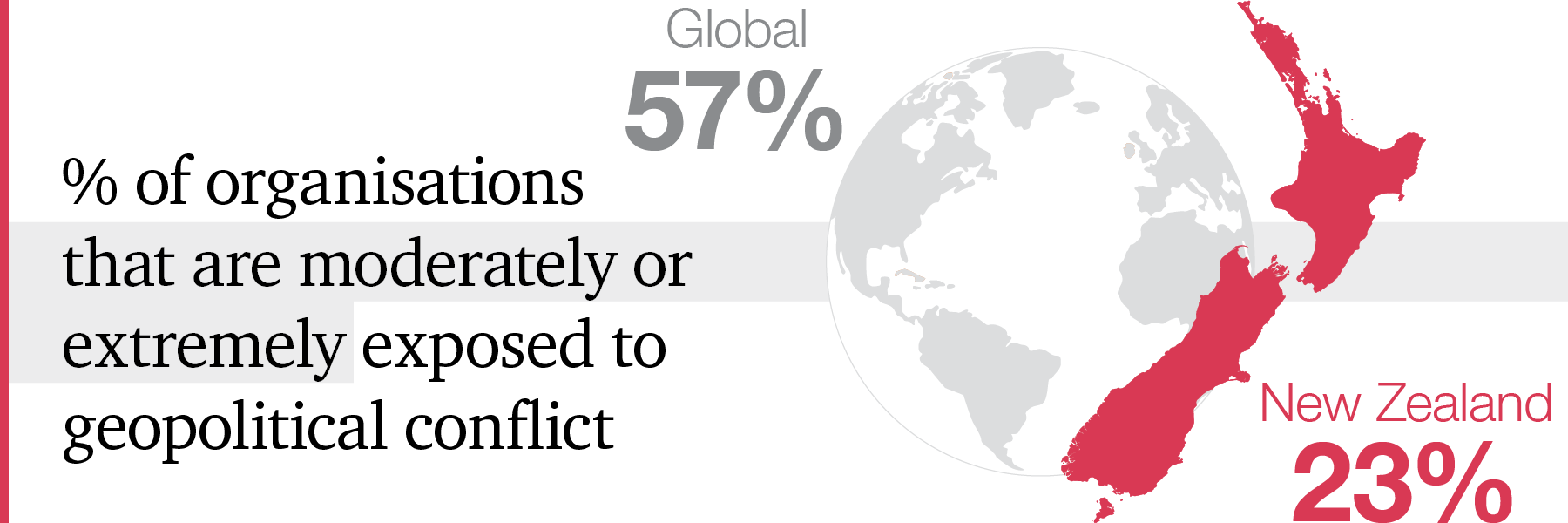The PwC Global Risk Survey results show an interesting disparity between New Zealand business leaders and their global counterparts. While 23% of New Zealand leaders believe their organisations are moderately to extremely exposed to geopolitical conflicts, businesses globally anticipate far higher levels of exposure at 57%. We explore the potential impact of geopolitical factors on New Zealand businesses, and provide insights on the actions business leaders can take to protect their organisation.

Geographical isolation does not equate to economic insulation
New Zealand's geographical isolation has often been seen as a shield against global geopolitical risks. However, this perception may not hold true in today's interconnected world. Despite being distanced from conflict hotspots, New Zealand's long supply chains, both upstream and downstream, can be vulnerable to disruptions at pinch points within the global network. Geopolitical flare-ups can have far-reaching consequences for New Zealand businesses. The Coalition Government has set a target to double New Zealand’s exports in the next 10 years from $96bn to $190bn. This will see New Zealand’s exposure to geopolitical risk grow.
To effectively manage geopolitical risks, New Zealand organisations should undertake a deliberate assessment of their supply chains. This should involve mapping both upstream and downstream pinch points and identifying key areas of potential interruption. By understanding where their inputs come from and the passages of freight, businesses can identify vulnerabilities and develop contingency plans.

Diversification for risk mitigation
Diversification is a crucial strategy for New Zealand businesses, in terms of market concentration, distribution and supply chain sources. While diversifying markets may be challenging, exploring new markets can help reduce dependence on a single region and spread the risk. Similarly, diversifying supply chain sources, even across different hemispheres, can provide critical resilience in case of disruptions.
The recent renewal of a partnership between Kotahi, New Zealand’s largest containerised freight manager and Maersk, a global integrated logistics company, is an example of a collaboration that will help to mitigate geopolitical risk factors. The partnership aims to provide a stable, resilient and sustainable global supply chain for New Zealand’s primary industry exporters.

As well as mapping their supply chain, businesses should explore partnerships with new suppliers in different regions, and regularly monitor and evaluate the performance of supply chain components. Building strong relationships with suppliers, customers, and industry peers can facilitate information sharing and collaborative risk management. Developing contingency plans, investing in robust infrastructure, and fostering a culture of adaptability and innovation can enhance resilience and enable businesses to navigate geopolitical uncertainties.
Addressing risk in an interconnected world
New Zealand businesses cannot afford to be apathetic about the impact of geopolitical risks. Despite geographical isolation, the interconnectedness of the global economy means that disruptions in one part of the world can have ripple effects. By consciously assessing supply chain risks, diversifying markets and sources, and fostering collaboration and resilience, New Zealand organisations can better protect themselves against the potential consequences of geopolitical conflicts. Acknowledging and addressing these risks is crucial for long-term success in an increasingly complex and interconnected world.
Author: Andrew Jamieson
Are you a Risk Pioneer? Take our real-time benchmarking survey.
This ten-minute survey will compare your responses with our global study data to help you explore your approach to risk and reveal your risk archetype.

Contact us
If you’d like to learn more about the survey, or talk about any of the topics covered, please reach out to one of our team or click here.










